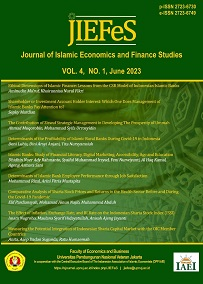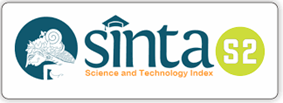Ethical Dimensions of Islamic Finance: Lessons from the CSR Model of Indonesian Islamic Banks
DOI:
https://doi.org/10.47700/jiefes.v4i1.5823Keywords:
Enviroment, Ethical Values, Islamic Banks, Islamic Finance, SocialAbstract
The Islamic financial system is regarded as a financial system that bases its operations on the values
of Islam. However, the practice of the Islamic financial industry has been criticized as it deviates from
the theory. This paper aims to explore and analyze the ethical values of Islamic finance and their
implementation in Indonesian Islamic commercial banks. The study employs a qualitative research
method with the literature study approach and assessment of the annual reports of 14 Indonesian
Islamic commercial banks. The literature study explores and analyses Islamic values embedded within
the Islamic financial system. In contrast, the exploration and assessment of Indonesian Islamic
commercial banks’ annual reports provide the study with the practical implementation of the values.
The paper found that Indonesian Islamic commercial banks have contributed to facing the current
social and environmental issues through some initiatives in their CSR implementations. All Indonesian
Islamic commercial banks have been actively participating in CSR programs. However, a number of
Islamic banks need to enhance their CSR practices to tackle the ongoing environmental issues.
Therefore, the paper comes with some limitations and policy recommendations.
References
Ainun, Moh. B. (2020). Behind the deviation of islamic bank from sharia principles. The Indonesian Accounting Review, 10(1). https://doi.org/10.14414/tiar.v10i1.1919
Al-Jarhi, M. A. (2020). Reforming Islamic Finance. Journal of King Abdulaziz University: Islamic Economics, 33(2), 7.
Athief, F., & Ma’ruf, A. (2023). Tracing the asymmetry of religiosity-based loyalty of Islamic bank depositors. Banks and Bank Systems, 18(1), 1–13. https://doi.org/10.21511/bbs.18(1).2023.01
Belouafi, A. (2020). Reforming Islamic Finance Industry: Where from? .. Where to? Journal of King Abdulaziz University: Islamic Economics, 33(2), 16.
Cahyadin, M., Sarmidi, T., & Nurrachma, E. A. (2020). The Readiness of Islamic Banking in Indonesia to Implement Digital and Green Banking. Jurnal Ekonomi Pembangunan: Kajian Masalah Ekonomi Dan Pembangunan, 20(2), 176–192. https://doi.org/10.23917/jep.v20i2.6757
Darus, F., Fauzi, H., Purwanto, Y., Yusoff, H., Amran, A., Zain, M. M., Naim, D. M. A., & Nejati, M. (2014). Social responsibility reporting of Islamic banks: Evidence from Indonesia. International Journal of Business Governance and Ethics, 9(4), 356. https://doi.org/10.1504/IJBGE.2014.066275
Dinar Standard. (2022). State of The Global Islamic Economy. Dinar Standard.
Farooq, M. O. (2007). Partnership, Equity-Financing and Islamic Finance: Whither Profit-Loss Sharing? Review of Islamic Economics, 11.
Hakim, L., & Angraeni, F. M. (2022). Analisis Bibliometrik Tentang Riset Strategi Pemasaran Bank Syariah. HUMAN FALAH: Jurnal Studi Ekonomi dan Bisnis Islam, 9(2), 125. https://doi.org/10.30829/hf.v9i2.12897
Hasan, Z. (2019). Market Share Islamic Banking In Indonesia. IQTISHADUNA: Jurnal Ilmiah Ekonomi Kita, 8(1), 124–137. https://doi.org/10.46367/iqtishaduna.v8i1.157
Hassan, R. (2020). Al. Journal of King Abdulaziz University: Islamic Economics, 33(2), 14.
Hudaefi, F. A., & Noordin, K. (2019). Harmonizing and constructing an integinradteexdfmoramqae asÁ isdurailn-gShthaerīʿah performance of Islamic banks. ISRA International Journal of Islamic Finance, 11(2), 21.
Iqbal, Z., & Mirakhor, A. (2011). An Introduction to Islamic Finance. John Wiley & Sons, Inc.
Iqbal, Z., & Mirakhor, A. (2017). Ethical Dimensions of Islamic Finance (First Edition). Palgrave Macmillan.
Ismail, N. (2016). Scrutinizing The Epistemology of Islamic Economics: A Historical Analysis. TSAQAFAH, 12(1), 19. https://doi.org/10.21111/tsaqafah.v12i1.367
ISRA (2011). Islamic Financial System (first edition). International Shari’ah Research Academy for Islamic Finance (ISRA).
Iswanaji, C. (2018). Challenges inhibiting Islamic banking growth in Indonesia using the Analytical Hierarchy Process. Journal of Islamic Economics Lariba, 4(2), 57–70.
Khan, T. (2019). Reforming Islamic Finance for Achieving Sustainable Development Goals. Journal of King Abdulaziz University Islamic Economics, 32(1), 3–21. https://doi.org/10.4197/Islec.32-1.1
KNEKS, (2018). Masterplan Ekonomi Syariah Indonesia 2019-2024. KNEKS.
OJK. (2022). Statistik Perbankan Indonesia. OJK (Otoritas Jasa Keuangan).
Puspitasari, L. L., & Muhammad, R. (2019). Perumusan Konsep Shariah Governance di Indonesia: Evaluasi Model Pengawasan Syariah di Sektor Perbankan. Muqtasid: Jurnal Ekonomi dan Perbankan Syariah, 10(1), 1. https://doi.org/10.18326/muqtasid.v10i1.1-16
Ridho, T. K., Рідо, Т. К., & Ридо, Т. К. (2016). The Influence of CSR on Performance and Its Determinants in Listed Companies in Indonesia. 11.
Saridona, R., & Cahyandito, M. F. (2015). Social Performance Analysis of Indonesia Islamic Banking Using Islamic Social Reporting Index. https://doi.org/10.2991/iceb-15.2015.29
Setiawati, E., Sekarningrum, A., & Witono, B. (2022). Analysis of CSR Disclosure, Earnings Persistency, Earing Growth, and Business Size on Earnings Management with Institutional Ownership as A oderating Variable (Case Study on LQ45 Companies Listed on the Indonesia). Riset Akuntansi Dan Keuangan Indonesia, 07(02).
Yuliartanti, A. R., & Handayani, R. S. (2023). The Influence of Disclosure of Corporate Social Responsibility (CSR) on Company Value with Investor’s Attention as Intervening Variable (Empirical Study on Infrastructure Companies Listed on the Indonesia Stock Exchange 2018—2020). Riset Akuntansi Dan Keuangan Indonesia, 7(2), 182–193. https://doi.org/10.23917/reaksi.v7i2.19239
Zulfikar. (2020). Challenges of Islamic Banking in Indonesia in Developing Products. The Journal of Management Theory and Practice (JMTP), 35–42. https://doi.org/10.37231/jmtp.2020.1.3.55
Downloads
Published
Issue
Section
License
Copyright (c) 2023 Aminudin Ma'ruf, Khairunnisa Nurul Fikri

This work is licensed under a Creative Commons Attribution 4.0 International License.
Authors who publish with this journal agree to the following terms:
- Authors retain copyright and grant the journal right of first publication with the work simultaneously licensed under a Creative Commons Attribution 4.0 International License that allows others to share the work with an acknowledgment of the work's authorship and initial publication in this journal.
- Authors can enter into separate, additional contractual arrangements for the non-exclusive distribution of the journal's published version of the work (e.g., post it to an institutional repository or publish it in a book), with an acknowledgment of its initial publication in this journal.
- Authors are permitted and encouraged to post their work online (e.g., in institutional repositories or on their website) before and during the submission process, as it can lead to productive exchanges, as well as earlier and greater citation of published work.

This work is licensed under a Creative Commons Attribution 4.0 International License.











